Aphids are definitely one insect you’ll want to keep far away from your pepper plants. There are thousands of different aphid species around the world, and you’ll find them in a variety of climates.
These pests attach themselves to the leaves of your pepper plants and suck the sap right out. Because they’re drinking all the sugary juices from the leaves, aphids end up excreting a sticky substance called “honeydew.” Ants feed on the honeydew substance that aphids produce, making for a viscous gardening cycle.
Most aphids are born pregnant, so they multiply incredibly quickly. If you suspect you have aphids on your pepper plants, you’ll want to act fast!
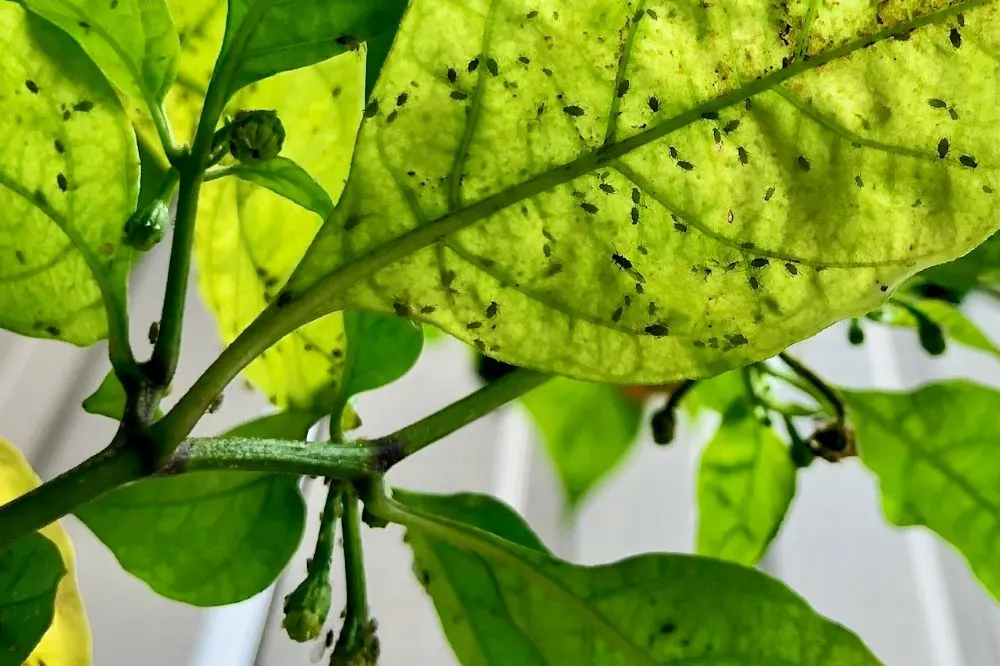
What Do Aphids Look Like?
These pests come in all shapes, sizes, and colors. This can make them difficult to identify. Their soft bodies are pear-shaped and often range from light green to dark brown. Aphids have long antennae and most have short cornicles extending from their behind.
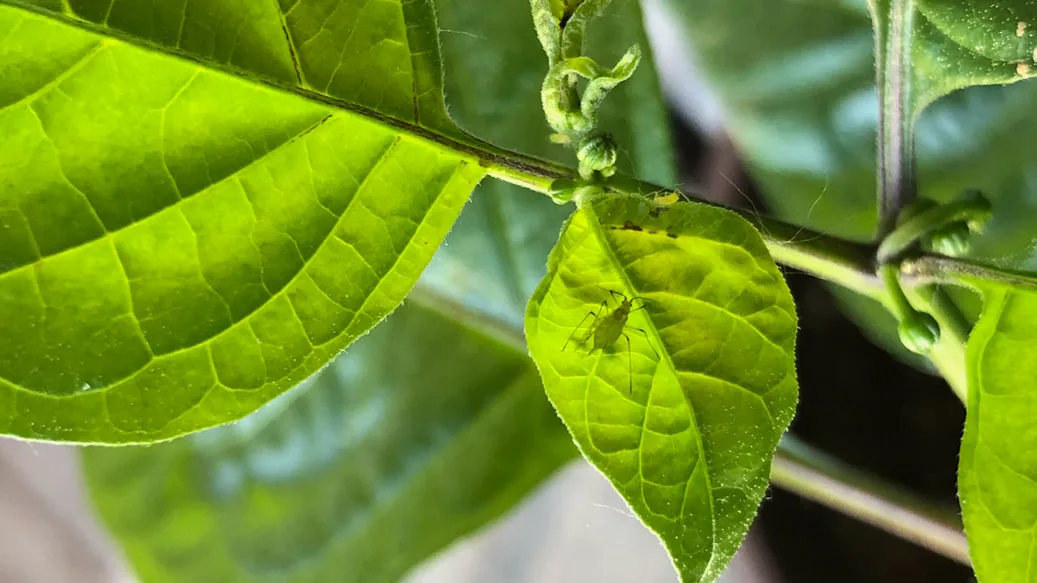
You won’t see aphids jumping or hopping, but sometimes they may fly or drift in the wind. You’ll often find them in groups, often hiding underneath newly formed leaves. Green aphids, the type we personally deal with most, camouflage themselves incredibly well!
If you’re having trouble identifying aphids on your pepper plant, try capturing some in a small plastic bag and consulting your local nursery. You can also use an insect identifier app.
Here are a few tips to spot aphids on pepper plants:
- Look at leaves from below. Viewing your plant’s leaves against the light can make aphids cast a shadow, making them easier to spot. If you can, hold your plant up to the sky and view the leaves from below.
- Look for small, dark spots along the leaf veins. As the aphids suck the sap out of your pepper plants, the affected areas will turn dark.
- Focus on new growth. Focus on the smaller, younger leaves of your pepper plants. Aphids are more attracted to new leafy growth than older, larger leaves. They tend to feed on the young leaves and will gather around them.
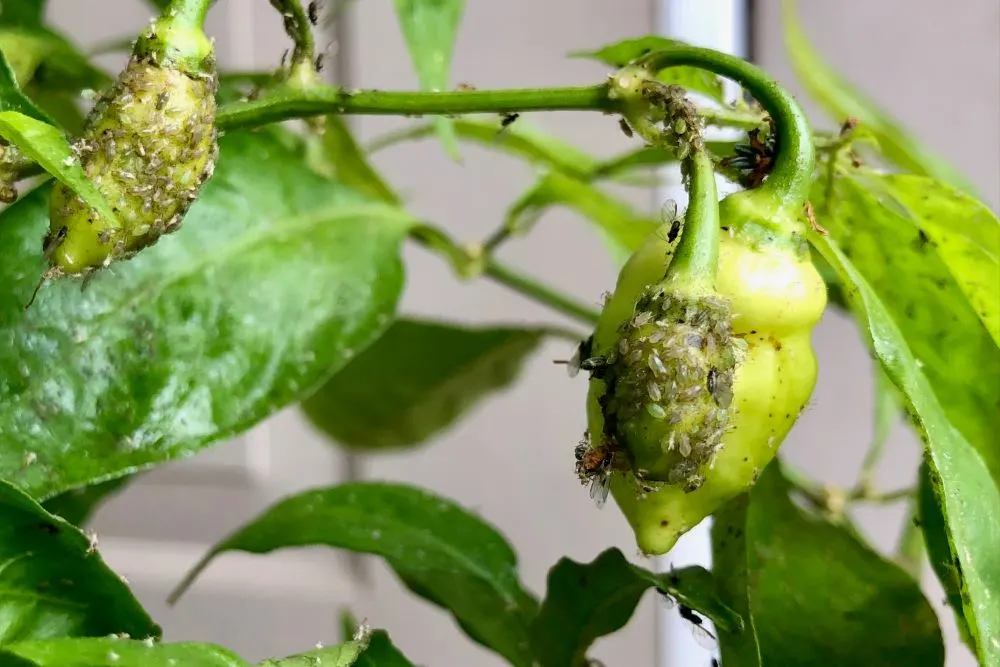
How To Get Rid Of Aphids On Pepper Plants
Whether you’ve found a cluster of aphids or a single insect, you’ll want to take action to control them. We recommend starting with natural methods, and only using insecticide when absolutely necessary. Here are some of the best ways to get rid of aphids on your pepper plants.
How To Get Rid Of Aphids (Video):
1. Blast With A Hose
If you’ve found aphids on your pepper plants, one of the easiest ways to remove them before treatment is to simply spray them with a hose. Remember, aphids don’t jump, and most don’t fly.
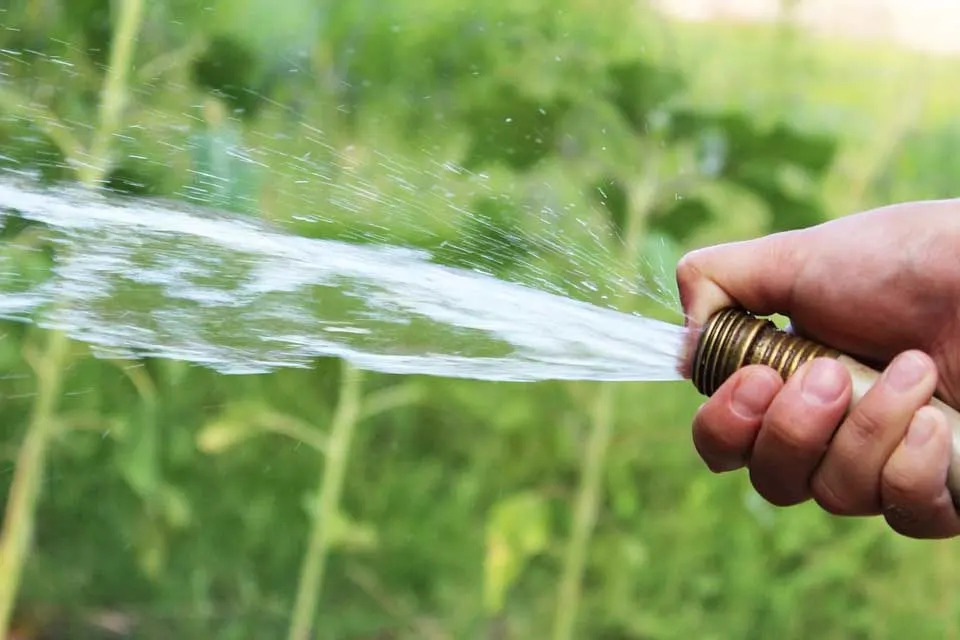
You’ll want to use your thumb over the front of the hose to create adequate pressure to knock them off. Starting from the top, aim the hose toward the underside of your leaves.
You won’t want to do this on any plants that are delicate or not strong enough to handle a blast of water. This is an excellent starting point for removing aphids before using one of the treatment options below. Be sure to let the leaves dry before treating the plants.
2. Natural Predators
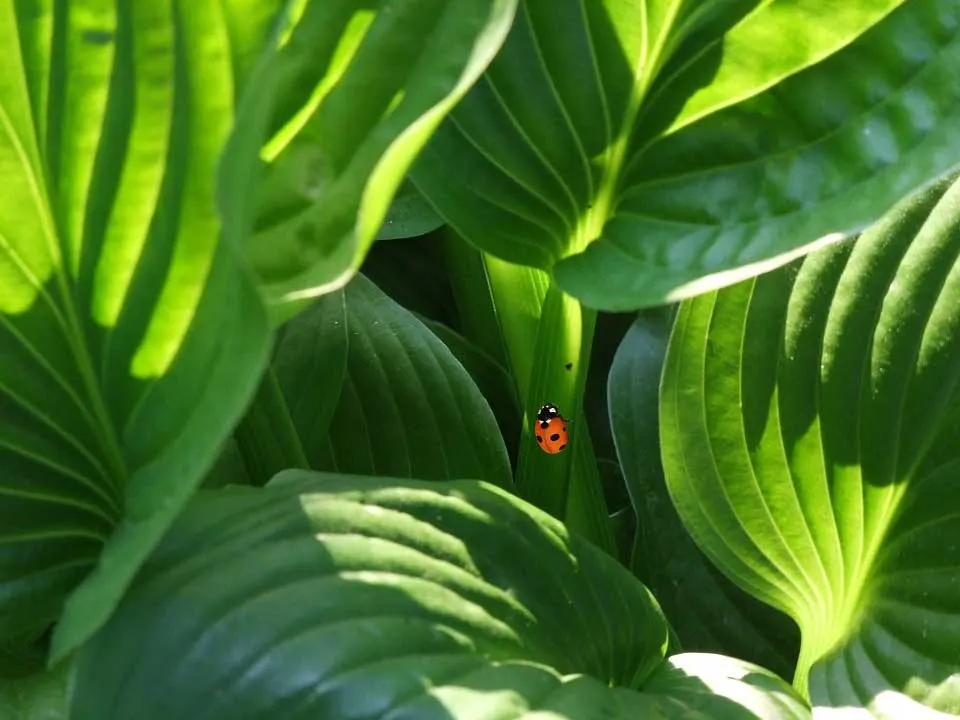
Ladybugs eat aphids, so we’re very happy when we see them on our pepper plants. But, there are many other beneficial insects that are more effective against aphids. Green lacewing eggs can be purchased for your garden. They’ll hatch, find your aphids, and have themselves a feast.
We don’t recommend purchasing ladybugs for your garden. It’s much better to attract native ladybugs with flowers, water, or even a ladybug house.
Predatory insects are the most natural solution for aphids and other pests in your garden. Plant alyssum to attract parasitic wasps and other beneficial to your garden to keep populations in balance.
Here are a few places you can buy beneficial insects online:
* Alternatively, you may want to consider green lacewings for aphid control.
Attract the predators naturally
Instead of buying live insects, why not attract them to your garden? Using flowers and other pepper companion plants, you can bring in lots of native insects that love to feast on aphids. Our quick tip is to plant lots of alyssum and other flowers nearby your garden.
3. Insecticidal Soap
If your aphid problem is indoors, or if the infestation is out of control, you may need to turn to spraying. One of the easiest and safest products for your plants is insecticidal soap.
These soaps usually come in a concentrated form that is then diluted with water. Then, it can be sprayed onto affected parts of the plants.
Keep in mind, it is still a good idea to start by knocking aphids off your plant and using natural control methods first. Then, you can spray selectively to get rid of any remaining aphids on your peppers.
Follow the directions on the soap you purchase to determine frequency of application. Also, avoid spraying your plants in excessive heat or when the sun is strongest. We like to spray in the evening.
4. Neem Oil
One of the most popular treatments for aphids and other common pests is neem oil. If you plan on using this treatment, be sure to buy 100% cold pressed neem oil with azadirachtin.
There are many products on the market that are extracts of neem, and will not be as effective in managing aphids. Neem oil is not an instant fix and will not eradicate aphids immediately. The oil works by starving the aphids and disrupting their natural reproduction cycle.
Note that pure neem oil may solidify at cooler temperatures. It is highly recommended that you make a solution of neem oil, lukewarm water, and a mild soap to emulsify the solution. (We recommend Dr. Bronners soap in peppermint). Shake the solution vigorously before spraying.
Do not spray your neem oil in the middle of the day when the sun is a threat. Spraying neem oil under intense sunlight will put your pepper plants at risk of burning. If there are small areas you can’t reach with the spray bottle, you can go over them gently with a Q-Tip. You can also use a soft toothbrush to gently brush delicate leaves.
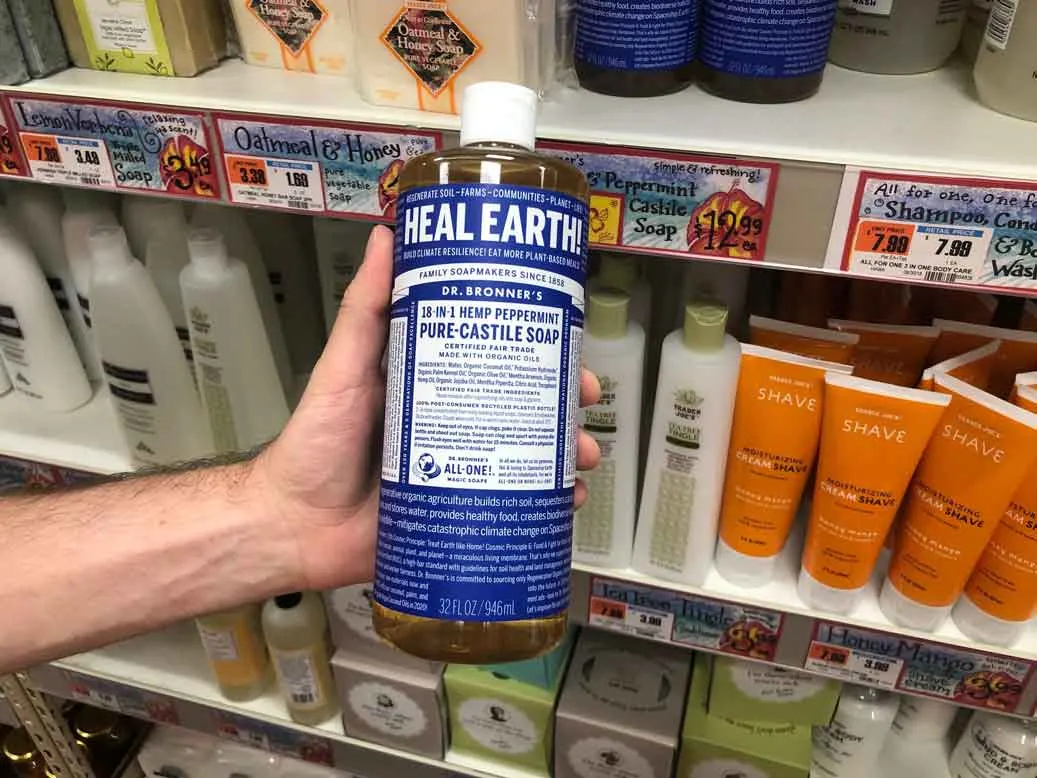
You can create a solution of neem oil, castile soap, and water. Do not use Dawn dish soap or any harsh detergents on your plants. If you wish to make your own solution, Dr. Bronners Castile soap is a good option. While the unscented version will work just fine, we like to use the peppermint scent as it naturally deters some other common pests.
The fatty acid in the soap breaks down the waxy coating on the aphids skin and dehydrates them. Our local Trader Joe’s stocks this soap, or you can buy it online.
You can also try using just soap and water at first, then adding neem oil later. Mix 1 Tablespoons of Dr. Bronners Castile soap to 1 gallon of water. If your garden is smaller, you can scale this recipe down.
5. Diatomaceous Earth
Diatomaceous earth is a naturally-occurring sedimentary rock that crumbles into a fine, white powder. This powder destroys the waxy outer layer of the aphids resulting in dehydration. To use diatomaceous earth, you’ll want to dust the leaves on your peppers while they’re still slightly wet. You’ll also want to sprinkle the powder around the base of the plant.
We recommend wearing a mask and glasses when working with diatomaceous earth. The particles are quite fine and may be irritating if they get in your eyes. Repeat the application process every few days, or after any heavy rainfall. You can find a generously sized bag on Amazon.
Diatomaceous earth is harmful to bees. If your aphid infestation is later in the season when bees are prevalent, consider covering your plants with protective netting or using an alternative method.
6. Companion Plants
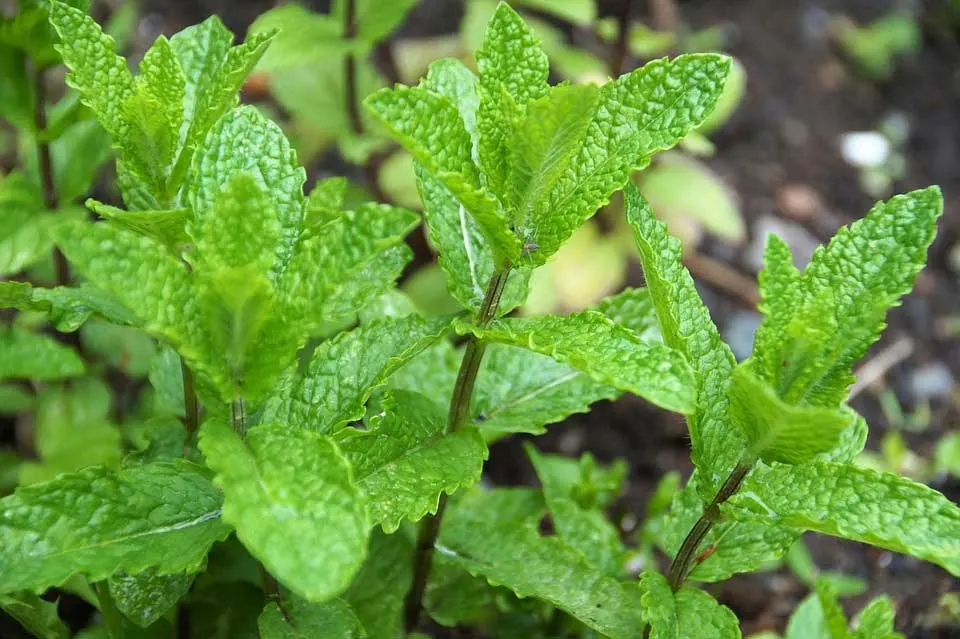
If you’re in the middle of an aphid infestation, companion plants may not help you. However, its great advice for next year’s garden. There are many herbs and flowers that will help keep the aphids under control. Consider planting some of the following companion plants in your garden:
- Alyssum
- Catnip
- Chives, onions, and garlic
- Mint
- Marigold
- Sunflowers
Homemade Aphid Spray
You can scale this recipe if you have a smaller garden and use a standard spray bottle. Remember, this spray may harm beneficial insects, too. Only spray insecticides as a last resort.
- 1 Tablespoons (.5oz – 1 oz) 100% cold-pressed neem oil
- 1/2 – 1 Tablespoon (.25 oz – .5 oz) Dr.Bronners castile soap
- 1 Gallon lukewarm water
Shake vigorously before each application.
If you’ve ever had an aphid infestation, you know how serious the issue can become. These pests are relentless. The key to controlling aphids on your pepper plants is to act fast and catch them before they multiply.
We hope this article helps guide you on eliminating aphids from your garden. Let us know which solutions have worked for you!

Crystalyn
Crystalyn loves spicy food and getting creative in the kitchen. When she isn’t finding new ways to use hot sauce, shes very busy watching cat videos on the internet.


Jim Whitfill
Thursday 12th of October 2023
I intend to start foliar feeding my pepper plants. Will using a neem oil spray to control aphids cause any problems with the plants absorbing the foliar nutrients?
Earl Holder
Saturday 27th of May 2023
I have aphids on my pepper plants...only two plants. I used some potting soil from last year. Could the potting soil I grew plants in last year be a reason I have aphids this year, using last years soil mix. I live in WY and 4 yrs of planting peppers, I have never had aphids.
peppergeek
Tuesday 30th of May 2023
They usually fly in where we are located, so nothing to do with the soil. If you brought the soil inside and you have aphids indoors, then it is most likely the soil.
Teresa
Saturday 6th of August 2022
Shout out for saving my shishitos! :)
Petar Marinov
Monday 30th of May 2022
There is only one organic solution that will immediately and easily get rid of aphids with extremely good results, and that is azamax. One or two applications max before the infestation is completely gone. This stuff works wonders! I've used it successfully to defeat aphids, trips, fungus gnats, and spider mites. I can't recommend it enough! It is OMRI certified organic and uses the same active ingredient as neem oil, azadirachtin. Seriously, this stuff works absolute wonders. It brought my indoor pepper plants from months of zero production to booming with peppers only 2-3 weeks after first spraying. It is more expensive than most, that's the only downside. 100% worth it though!
Coreen Lecocq
Thursday 6th of October 2022
@Petar Marinov, can you please give me the exact name of the product you use and where it can be ordered from. I had a problem with fungus gnats last year indoors and want to prevent it with my overwintering of plants this year. I have learned several tips I didn’t know last year but I still have them in my house and I tried many things to kill them off. It would be greatly appreciated to know specifically what you use.
Heather
Saturday 2nd of April 2022
Thank you! We had no problems with aphids until we moved the plants indoor for the winter. I wanted ladybugs but hubby didn’t think that would be a good idea indoors 😅. I thought it would be fun. Maybe this year we can agree on a natural treatment that doesn’t fly around the living room.
peppergeek
Saturday 2nd of April 2022
Haha! Yep, we definitely have ladybugs flying around indoors, but they're harmless. Unfortunately we don't have enough to control an infestation if it happened. Thankfully outdoors the problems usually correct themselves